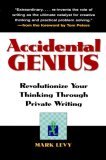September 22, 2007
I’ve been dipping into this book recently: Accidental Genius: Revolutionize Your Thinking Through Private Writing by Mark Levy.
by Mark Levy.
 Levy advocates timed private writing, a concept similar to Julia Cameron’s “morning pages” (see The Artist’s Way). What I like about Levy’s book is that he focuses on thinking much more than the process of writing. The book is billed as a business book so the examples tend to be business-oriented, but the process can be applied to any situation. It’s also a nice, short, easy read at around 130 pages.
Levy advocates timed private writing, a concept similar to Julia Cameron’s “morning pages” (see The Artist’s Way). What I like about Levy’s book is that he focuses on thinking much more than the process of writing. The book is billed as a business book so the examples tend to be business-oriented, but the process can be applied to any situation. It’s also a nice, short, easy read at around 130 pages.
For example, one chapter talks about “focus-changers” and gives a list of about 35 questions, such as:
- What was I thinking here?
- How else can I say that?
- How can I make this exciting?
- How can I add value?
- Why am I stuck at this particular point?
- What do I think about that?
- What does this remind me of? (p 42-43)
A limited preview is available at Google Book Search.
The author’s website has a “lost” chapter.
Comments (1)
- mind
September 19, 2007
In honor of Priscilla Palmer’s list of personal development bloggers, which continues to grow, here is a link to Amazon’s most popular books on personal transformation . If this works like I think it will, it should change to show the top books at the time the link is clicked. Right now the most popular book is Choices and Illusions: How Did I Get Where I Am, and How Do I Get Where I Want to Be?
. If this works like I think it will, it should change to show the top books at the time the link is clicked. Right now the most popular book is Choices and Illusions: How Did I Get Where I Am, and How Do I Get Where I Want to Be? by Eldon Taylor.
by Eldon Taylor.
Following is the full list of personal development bloggers as of now:
(more…)
Comments (5)
- happiness,mind,psychology
September 17, 2007
Important Books on the Brain: An Annotated Bibliography of Fiction and Non-Fiction
“The following descriptions focus on widely praised books about the brain, both scientific and literary. The selections are excerpted from articles in Cerebrum: The Dana Forum on Brain Science.”
Comments (0)
- cognitive science,fiction,mind
September 16, 2007
“There are two kinds of people…..” (and many ways to divide people into two kinds!)
“Categorization is the process in which ideas and objects are recognized, differentiated and understood. Categorization implies that objects are grouped into categories, usually for some specific purpose.” (from Wikipedia)

A good introduction to the topic for the general reader can be found in The Mind’s New Science: A History of the Cognitive Revolution by Howard Gardner (New York: Basic Books, 1985, 1987) – Ch. 12 “A World Categorized.”
by Howard Gardner (New York: Basic Books, 1985, 1987) – Ch. 12 “A World Categorized.”
The work of Eleanor Rosch was instrumental in overturning the classical view of categories based on “necessary and sufficient conditions” in favor of a psychological approach to the structure of categories based on prototypes.
Rosch discusses her work on categorization in this transcribed interview: “Categories have what I called a graded structure of better and worse examples, and many categories have unclear boundaries”
Books on categorization:
Comments (0)
- alphabet,mind
by Mark Levy.
 Levy advocates timed private writing, a concept similar to Julia Cameron’s “morning pages” (see The Artist’s Way). What I like about Levy’s book is that he focuses on thinking much more than the process of writing. The book is billed as a business book so the examples tend to be business-oriented, but the process can be applied to any situation. It’s also a nice, short, easy read at around 130 pages.
Levy advocates timed private writing, a concept similar to Julia Cameron’s “morning pages” (see The Artist’s Way). What I like about Levy’s book is that he focuses on thinking much more than the process of writing. The book is billed as a business book so the examples tend to be business-oriented, but the process can be applied to any situation. It’s also a nice, short, easy read at around 130 pages. This list should change as Amazon updates their bestseller information:
This list should change as Amazon updates their bestseller information: 


